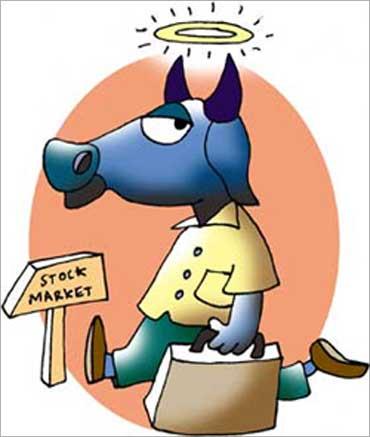Photographs: Uttam Ghosh/Rediff.com Narendar Lokwani
Identifying and rectifying these can make you a winner
There is lot of literature available on how to make money in stock market trading, but any experienced trader will tell you that failure is the best teacher.
It took the best traders of the world, several bouts of wipeouts to realise what mistakes they were doing. Only after the process of realising, accepting and rectifying their mistakes, the large traders were able to bounce back and win more money than they lost.
So what are these top mistakes and how to identify your mistakes if one is consistently losing money in markets!
Trading with large positions in comparison to your account size
Number one mistake at the very top of this list that a trader can make is overtrading and taking very large bets in comparison to his account size. Futures trading takes place on margin accounts and most brokers lure you with very low margin requirement, sometimes even lower than the statutory limits.
This small margin requirement encourages the day trader to take large bets, assuming that if the bet goes right, he will make huge profits in one shot. More often than not, the bets do not work out and a substantial portion of account is wiped out immediately.
Overtrading, i.e. taking a large number of trades in a single day is another mistake that piles up the trading costs i.e. brokerage and taxes, and reduces your take home profits.
Trading less and trading in proportion to your account size is the mantra to stay on the trading pitch for long. Only when you bat for more overs, you end up making more runs!
Starting off with a very small trading account
Most traders start with a very small trading account, just enough to pay margin for 1-2 lots and trade to the maximum limit permissible by broker.
This is a mistake, as there is no room for error and few wrong bets would wipe out the account. This delivers a psychological blow to the trader, which ends his trading career prematurely.
However, having an extremely large account is also not the right approach. Having just enough cushion in your account is right approach to ride through the bad market patches and having enough absorbing capacity for a few losing trades.
One needs an account to survive various market conditions for at least 1-2 years to have a sustainable long-term career as a trader.
StockFundooLiveCalls.com provides insightful and in-depth capital markets analysis. Powered by technical analysis and price action, we offer live stock analysis updated on intra-day basis.
Top 8 reasons you lose money in stock markets
Photographs: Dominic Xavier/Rediff.com
Trading based on tips, rumours and hunches
Lacking good analytical skills and lack of confidence in your trading systems is another mistake that novice traders make. This leads to search for a right system taking you to doorstep of various stock market tipsters whose job is to fleece you of your hard-earned money.
Believing in broker’s tips is also not a good strategy.
Only sustainable strategy in the long term would be to develop your own trading style, in line with your psychological makeup and account size.
Never trade on rumours, tips or gut-feel, but always trade on right side of trend and only after due analysis of market is made.
Not analysing your trades and repeating the same mistakes
A successful trader always spends time off the markets to look at his trades made during the market hours. During the intensity of market session, one is not able to fully grasp the result of each and every trade. Hence time spent post-markets is very helpful for traders to analyse their trading style and trade better in the next session.
Top 8 reasons you lose money in stock markets
Photographs: Dominic Xavier/Rediff.com
Trading without a stop loss
This is a colossal mistake made more commonly than believed. It is joked in trading circles that a short term losing trade made without stop loss, often becomes a long-term investment for the trader.
This is so because it is difficult to get out of the losing trade without a pre-decided stop loss level.
Always ensure you have a stop loss order fed in the system, so that even when you are away from your desk, the stop loss order takes away the uncertainty. It will help you to trade with less stress and taking a small loss is always better than hoping that the cycle reverses when a large trade without a stop loss level goes severely against your expectations.
Not taking a break when losing
Famous gamblers often got wiped out in one single night, after severe bouts of loss making bets, even though they were experienced, rich and successful. When going is tough, the tough always take a break!
One needs to be alive for the next trading day, in order to be successful in the long term.
If you are having a bad day, week or a month, simply stop trading for a while! Take a break to review your trading system and rejoin the markets when you are rejuvenated.
Markets will always exist once you are back.
Top 8 reasons you lose money in stock markets
Photographs: Dominic Xavier/Rediff.com
Not maintaining a trade diary
Maintain a log of your trades, your starting capital and ending capital every trading day. This helps you to stay disciplined and will avoid several mistakes highlighted above.
Take trading as a business, and like a shopkeeper always keeps a detailed ledger with you.
Hiding losses from your family
Gamblers and losing traders hide their losses from their families. Not only this creates a dynamite loaded situation when you are finally exposed, but also creates severe stress in mind of isolated traders.
Always keep you loved ones in loop of your activities.
This is the most stressful business in the world, and your family needs to know your current status for them to back you in tough times.






Comment
article